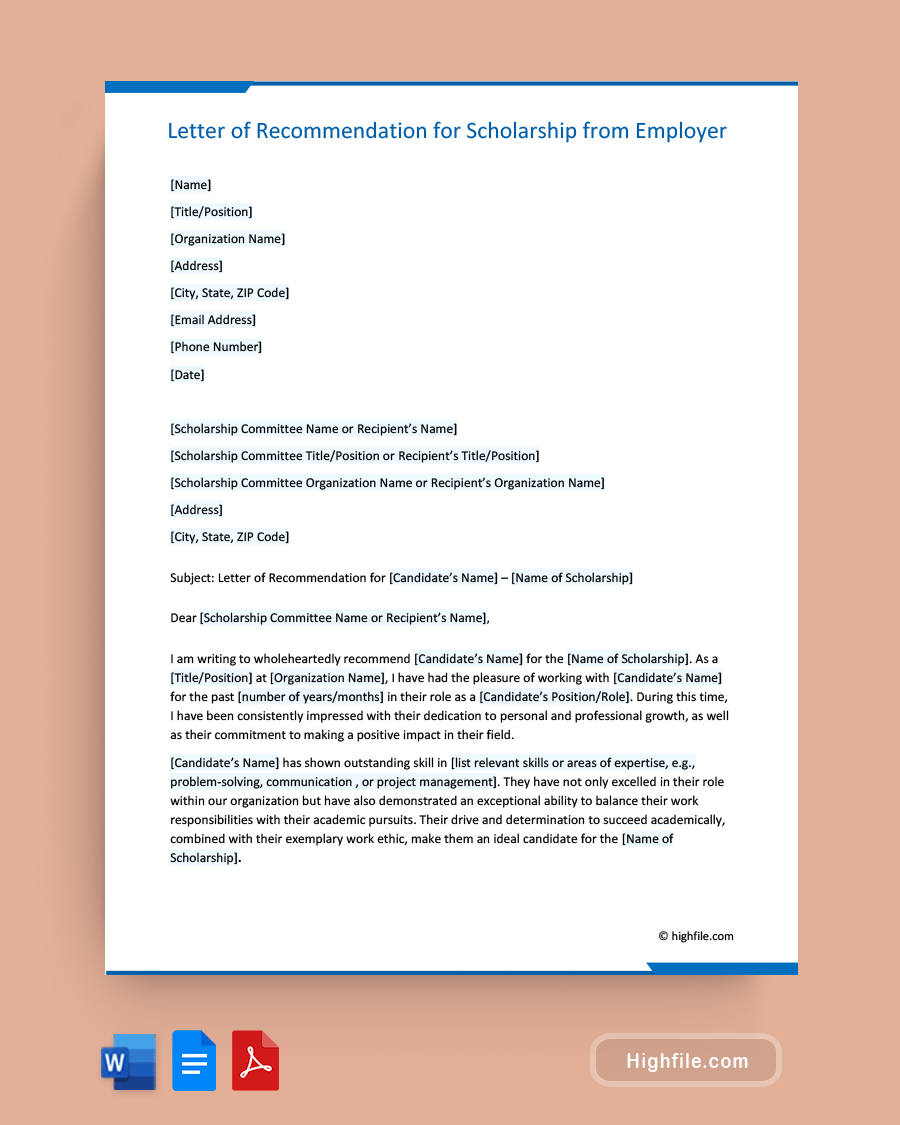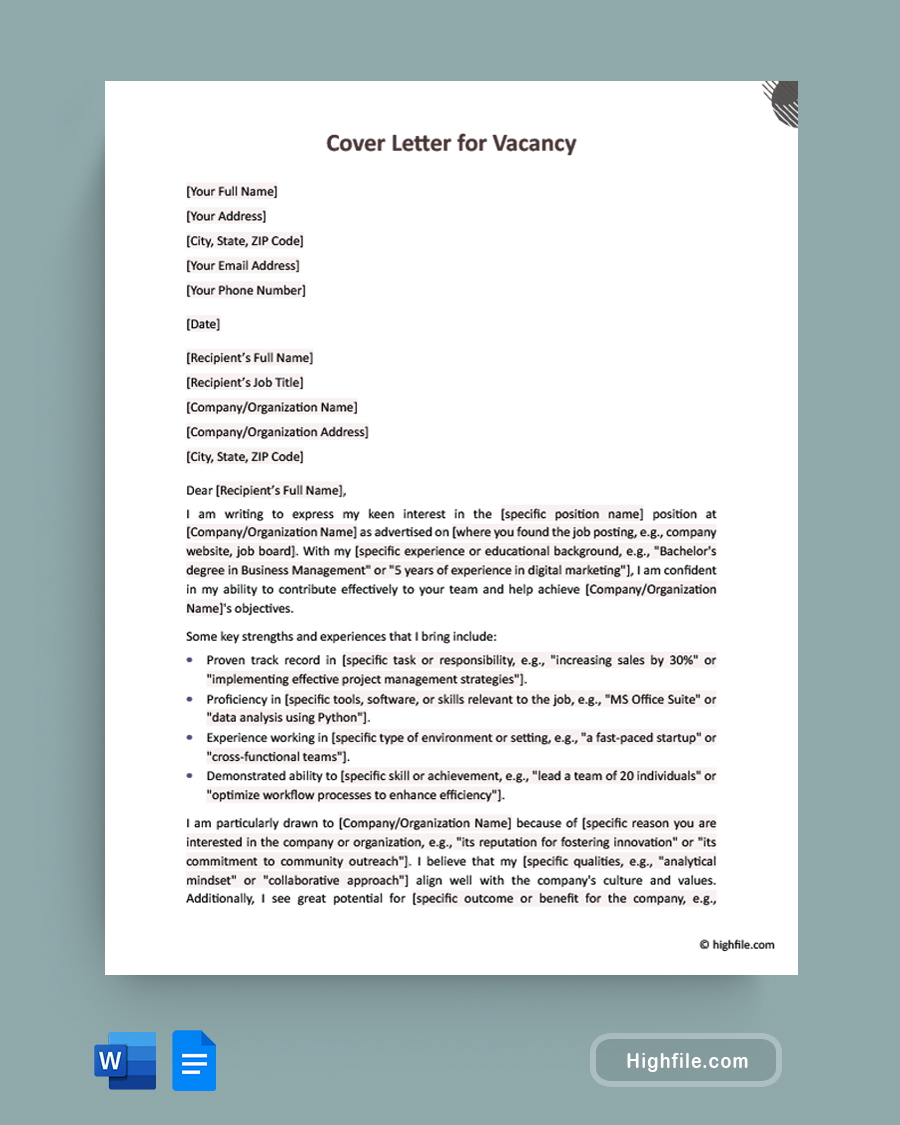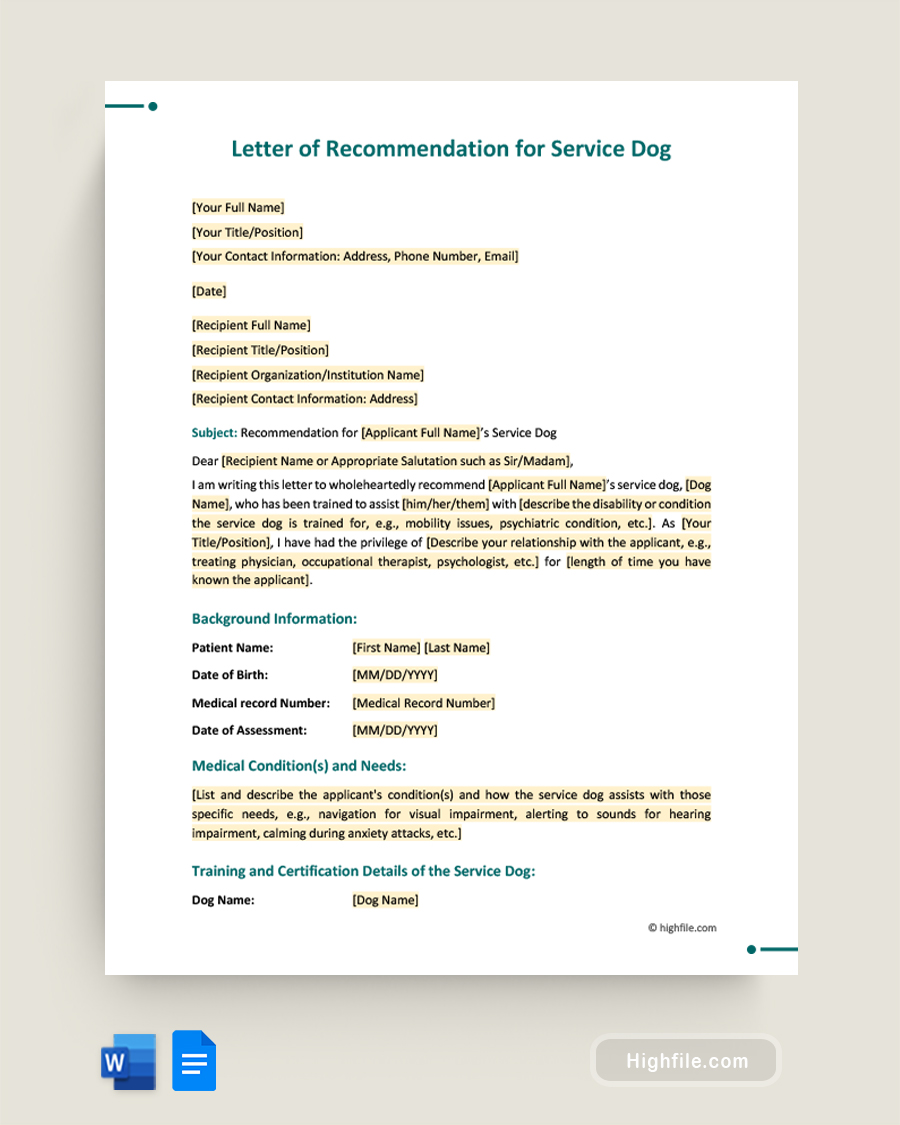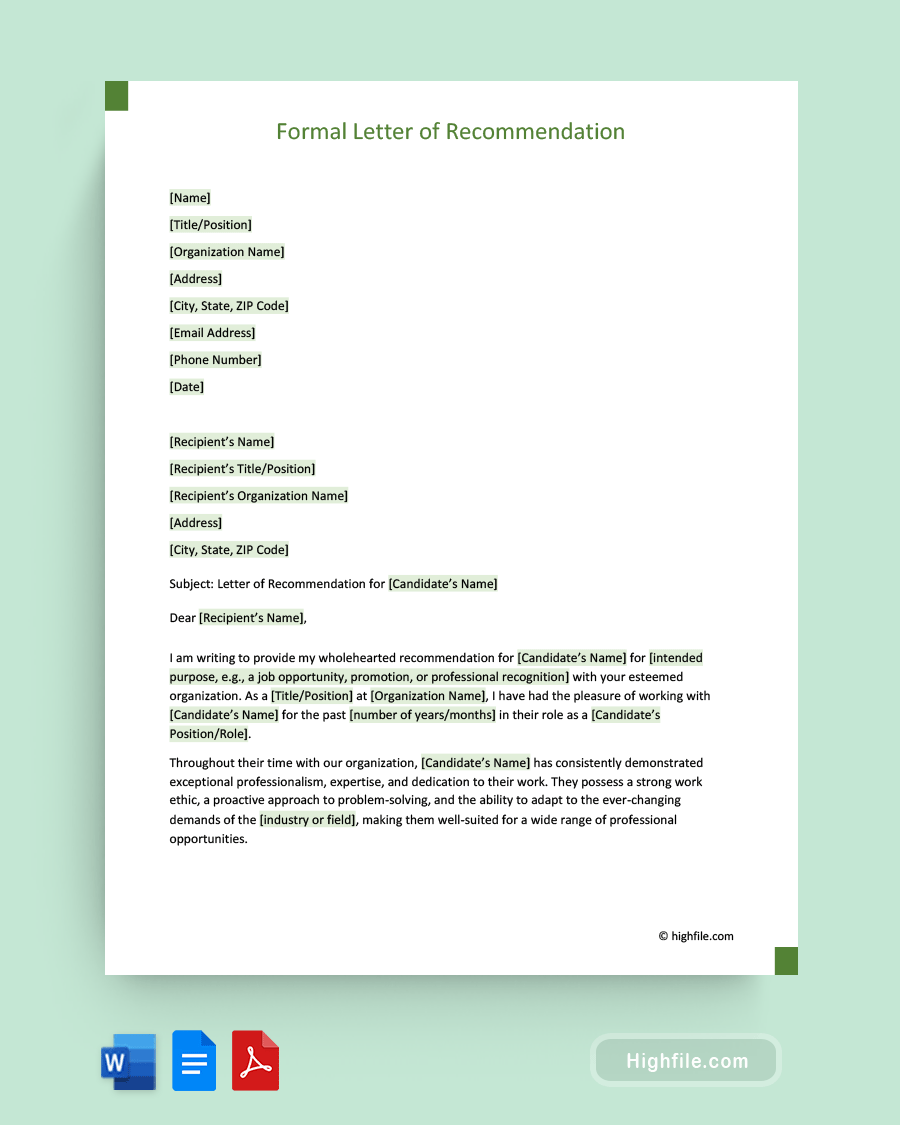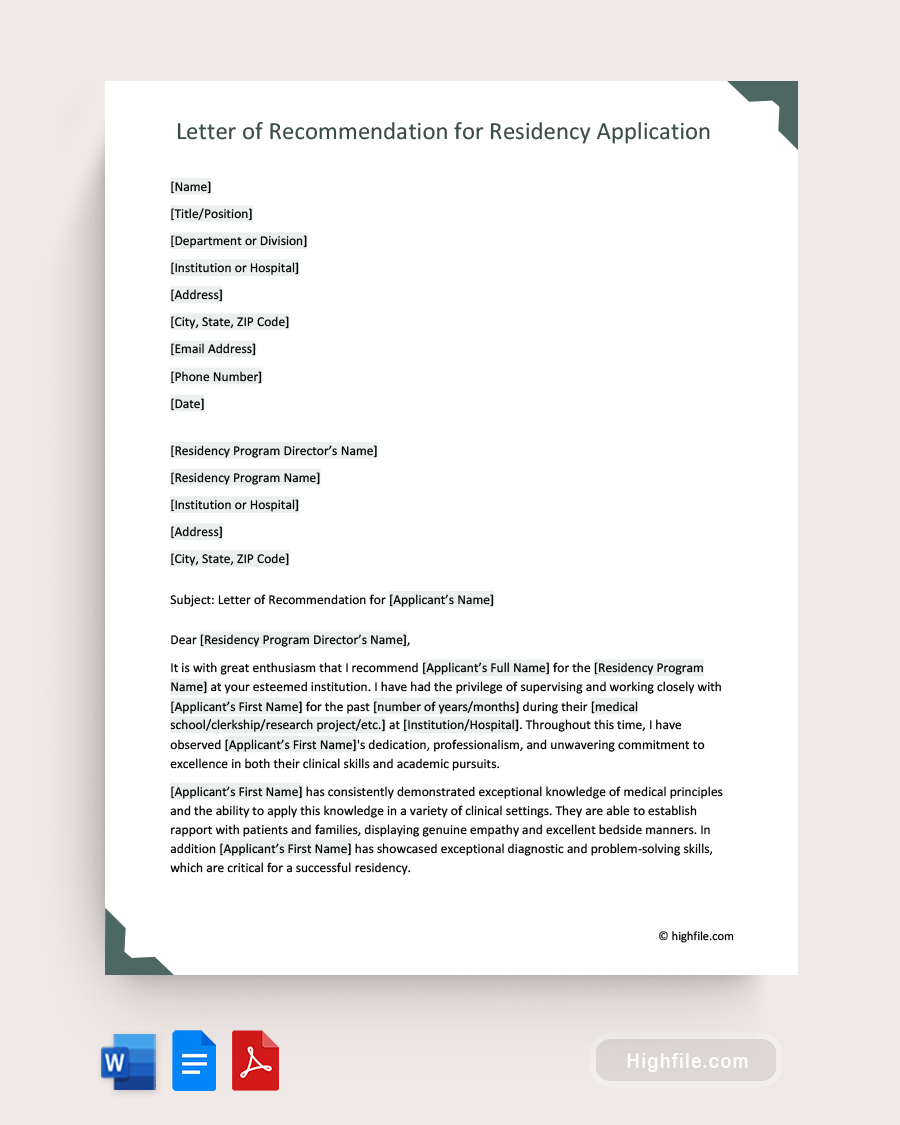A Letter of Recommendation for a Scholarship from an Employer is a crucial document that can significantly benefit a candidate. Scholarship committees typically require these letters to evaluate the candidate’s qualifications, achievements, and potential for success. The letter is a testament to the candidate’s skills, work ethic, character, and overall performance and can distinguish them from other candidates. A well-written letter can also give the scholarship committee valuable insights into the candidate’s suitability for the scholarship and help them make informed decisions. Using a template can help the writer ensure that the letter follows the proper format, covers all the necessary information, and presents a professional and polished image of the candidate and the employer.
What Is a Letter of Recommendation for Scholarship from an Employer?
A letter of recommendation for a scholarship from an employer is a formal document written by an employer or supervisor to support an employee’s application for a scholarship. The letter evaluates the employee’s skills, qualifications, work experience, and personal qualities and highlights why they deserve the scholarship. The letter can significantly impact the employee’s chances of receiving the scholarship.
The Importance of Employer Recommendations in Scholarship Applications
A strong letter of recommendation from an employer can play a vital role in a scholarship application, showcasing the candidate’s qualifications, achievements, and potential for future success. Here are some key reasons why employer recommendations are important:
- Provides valuable insight into the candidate’s work ethic, character, and accomplishments.
- Demonstrates the candidate’s potential for success in an academic or professional setting.
- Provides evidence of the candidate’s leadership, teamwork, and communication skills.
- Helps the selection committee differentiate the candidate from other applicants.
- Offers reassurance to the selection committee that the candidate is reliable, competent, and deserving of the scholarship.
- It can open doors to new educational and professional opportunities for the candidate.
How to Write a Letter of Recommendation for a Scholarship from an Employer
When an employer is asked to write a letter of recommendation for a scholarship, it is crucial to provide a comprehensive and professional recommendation showcasing the applicant’s strengths and qualifications. The following is a list of how to write a letter of recommendation for a scholarship from an employer step by step:
- Gather information about the scholarship and the applicant’s qualifications
- Format the letter according to the scholarship’s guidelines and use a template if available
- Begin with a formal salutation and introduction
- Highlight the applicant’s skills and personal qualities relevant to the scholarship
- Provide examples of the applicant’s personal and academic achievements
- Include a summary endorsement of the applicant’s qualifications
- End with a professional closing and contact information
- Edit the letter for clarity, grammar, and punctuation
Submitting the Letter: Deadlines and Submission Guidelines
Submitting a scholarship recommendation letter is critical to the application process. To ensure the letter is accepted and considered, it is crucial to adhere to submission guidelines and deadlines. This list provides guidance on preparing, submitting, and confirming receipt of a letter of recommendation for a scholarship application.
- Understanding Deadlines:
- Verify the deadline with the applicant
- Be mindful of differences in time zones
- Allocate adequate time for writing, editing, and submitting
- Adhering to Guidelines:
- Examine the scholarship submission criteria
- Check word count, formatting, and document type
- Follow specific guidelines from the scholarship committee
- Preparing for Submission:
- Use the scholarship and candidate’s full name as the file name
- Make sure all information is correct and up-to-date
- Save in proper file formats, such as PDF or Word document
- Submitting Online:
- Set up an account or log in to the scholarship website as needed
- Send the letter and additional necessary documents
- Verify successful submission
- Retain a confirmation information
- Submitting via Email:
- Utilize a professional email address and a clear subject line
- Write a brief, courteous message to the scholarship committee
- Add the letter and documents as separate attachments
- Submitting via Physical Mail:
- Choose an appropriately sized envelope
- Print on quality paper
- Add a handwritten signature
- Mail the letter well in advance of the deadline, with sufficient postage and tracking
- Make a duplicate for your records and one for the candidate
- Confirm Receipt of the Letter:
- Verify that the letter has been received
- Provide support if there are any difficulties with the submission process.
- Be available to answer follow-up questions
- Keep a copy
FAQs
If you don’t have the names of the scholarship selection committee members, there are some general ways to address them in your letter. Here are some examples:
ᐅ Dear Scholarship Committee: This is a standard and formal way to address the committee.
ᐅ To Whom It May Concern: This option is more general and less personal.
ᐅ Dear [Name of Scholarship]: If the scholarship has a specific name, you can address the committee by the scholarship name.
Remember to maintain a professional tone and avoid overly casual language, regardless of how you address the committee.
Collaboration with the applicant is crucial for an effective recommendation letter. Here are some ways to collaborate with the applicant to ensure the letter accurately reflects their professional accomplishments and aspirations:
ᐅ Request a current resume or CV to help identify specific accomplishments and experiences to highlight in the letter.
ᐅ Schedule a meeting or conversation to discuss the applicant’s goals, strengths, and areas of improvement. This will help you write a more personalized and compelling letter.
ᐅ Ask the applicant to provide specific examples of their accomplishments, such as projects they have completed or initiatives they have led. Use these examples to illustrate their strengths and potential.
ᐅ Consider asking the applicant to provide a rough draft or outline of the letter, which you can then revise and personalize to meet the requirements of the scholarship or award.
ᐅ Be sure to communicate regularly with the applicant throughout the process to ensure that the letter accurately reflects their accomplishments, aspirations, and goals.
When discussing the applicant’s leadership and teamwork experiences in a letter of recommendation for a scholarship, it is essential to highlight how these experiences demonstrate their potential for success in an academic setting. Provide concrete examples and connect the applicant’s leadership and teamwork experiences to their potential for academic success. Here are some strategies and examples:
ᐅ Describe specific instances where the applicant demonstrated leadership, such as taking charge of a group project or leading a student organization.
ᐅ Explain how the applicant’s leadership skills can translate to academic success, such as their ability to delegate tasks, communicate effectively, and motivate others.
ᐅ Discuss the applicant’s experience working in a team, highlighting their ability to collaborate with others, listen actively, and contribute to group goals.
ᐅ Emphasize how the applicant’s teamwork skills can benefit them in an academic environment, such as working effectively with classmates and professors, contributing to class discussions, and supporting fellow students.
Key Points
A letter of recommendation for a scholarship from an employer can significantly benefit the candidate by providing evidence of their skills, achievements, and work ethic. This type of letter can also demonstrate the employer’s confidence in the candidate, boosting their chances of receiving the scholarship. Using a template can help the writer ensure that the letter follows a professional format and includes all the necessary information, making it more effective in promoting the candidate’s qualifications.
